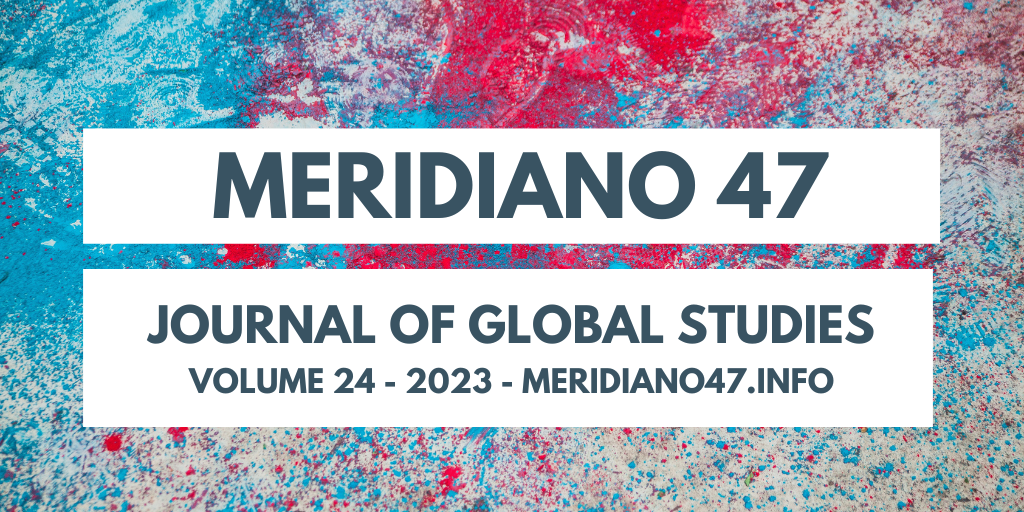Hedging strategies in south korean security policy: a neoclassical realist analysis of south korean perceptions of China between 2013-2022
DOI:
https://doi.org/10.20889/M47e24007Keywords:
China, South Korea, Hedging, Security Policy, Neoclassical RealismAbstract
The article analyzes South Korea's foreign policy strategy towards China during the administrations of Park Geun-hye (2013-2016) and Moon Jae-in (2017-2022) through South Korea's Defense White Papers and official documents during the aforementioned period. The objective is to understand whether South Korea employs a hedging policy in its relations with China to ensure strategic stability and economic prosperity.
References
Bedeski, Robert E. 1995. “Sino-Korean Relations: Triangle of Tension, or Balancing a Divided Peninsula?” International Journal(Toronto, Ont.) 50(3): 516. https://doi.org/10.2307/40203020.
Brazinsky, Gregg Andrew. 2005. “From pupil to model: South Korea and American development policy during the early Park Chung Hee era”. Diplomatic history 29(1): 83–115. http://www.jstor.org/stable/24914785.
Cha, Victor D. 2009. “Powerplay: Origins of the U.s. alliance system in Asia”. International security 34(3): 158–96. http://www.jstor.org/stable/40389236.
Chung, Jae Ho. 2003. “From a special relationship to a normal partnership?: Interpreting the ‘garlic battle’ in Sino-South Korean relations”. Pacific affairs 76(4): 549–68. http://www.jstor.org/stable/40026421.
Han, Seung-Mi. 2004. “The New Community Movement: Park Chung Hee and the making of state populism in Korea”. Pacific affairs 77(1): 69–93. http://www.jstor.org/stable/40022275.
Han, Sukhee. 2008. “From Engagement to Hedging: South Korea’s New China Policy”. Korean Journal of Defense Analysis 20(4): 335–51. https://doi.org/10.1080/10163270802507328.
Jaeho Hwang. 2014. “The ROK’s China Policy under Park Geun-hye: A New Model of ROK-PRC Relations”. International Journal of Korean Unification Studies 23(1): 103–30.
Kang, David C. 2009. “Between balancing and bandwagoning: South Korea’s response to China”. Journal of East Asian Studies 9(1): 1–28. http://www.jstor.org/stable/23418681.
Kim, Anna. 2020. “Understanding Japan–South Korea Cooperation and Friction through Neoclassical Realist Theory”. Jadavpur Journal of International Relations 24(1): 28–52. https://doi.org/10.1177/0973598419888279.
Koga, Kei. 2018. “The concept of “hedging” revisited: the case of Japan's foreign policy strategy in East Asia's power shift”. International Studies Review 20(4), 633-660
Lee, Ji-Young. 2020. “The geopolitics of South Korea–China relations: Implications for U.s. policy in the Indo-pacific”. https://www.rand.org/pubs/perspectives/PEA524-1.html.
Lye, Liang Fook, e Juan Chen. 2017. “China-South Korea Relations: Terminal High Altitude Area Defence System Deployment and Implications for Bilateral Ties”. East Asian Policy 09(04): 27–40.
Maduz, Linda. 2023. “Explaining Korea’s positioning in the US–China strategic competition”. Em China-US Competition, 247–73. Cham: Springer International Publishing.
ROK. Republic of Korea, Ministry of Defense. 2014 Defense White Paper, by National Defense Strategy Division. Seoul: Ministry of National Defense, 2014.
ROK. Republic of Korea, Ministry of Defense. 2016 Defense White Paper, by National Defense Strategy Division. Seoul: Ministry of National Defense, 2016.
ROK. Republic of Korea, Ministry of Defense. 2018 Defense White Paper, by National Defense Strategy Division. Seoul: Ministry of National Defense, 2018.
ROK. Republic of Korea, Ministry of Defense. 2020 Defense White Paper, by National Defense Strategy Division. Seoul: Ministry of National Defense, 2020.
No to Three No’s. 2022. The Korea Herald, Seul, 12 de ago. de 2022. Disponível em: https://www.koreaherald.com/view.php?ud=20220811000838
Rose, Gideon. 1998. “Neoclassical realism and theories of foreign policy”. World politics 51(1): 144–72.
Schweller, Randall L. 1994. “Bandwagoning for profit: Bringing the revisionist state back in”. International security 19(1): 72.
Schweller, Randall L. 1997. “New Realist Research on Alliances: Refining, Not Refuting, Waltz’s Balancing Proposition”. The American Political Science Review 91(4): 927–30.
Shambaugh, David. 2004. “China engages Asia: Reshaping the regional order”. International security 29(3): 64–99.
Shuquan, He, e Sora Ju. 2020. “The Impact of China-US Trade Conflict on Korean Economy”. Socioeconomic Challenges 4(4): 18–28.
Snyder, Scott, e See-Won Byun. 2020. “China-Korea Relations under Quarantine”. Comparative Connections. 15 de maio de 2020. https://cc.pacforum.org/2020/05/china-korea-relations-under-quarantine
South Korean president to Congress: ‘No North Korea provocations can succeed’. 2014. CNN, Atlanta, 8 de maio de 2014. https://www.cnn.com/2013/05/08/politics/south-korean-president-congress
South Korea’s Moon Jae-in willing to visit North Korea. 2017. Al Jazeera, Doha, 10 de maio de 2017. https://www.aljazeera.com/news/2017/5/10/south-koreas-moon-jae-in-willing-to-visit-north-korea
South Korea’s Leader Bluntly Warns U.S. Against Striking North. 2017. New York Times, Nova Iorque, 15 de ago. de 2017. https://www.nytimes.com/2017/08/15/world/asia/south-korea-moon-jae-in-trump.html
South Korea’s Moon Jae-in calls for ‘new era’ in China relations. 2017. Financial Times, Londres, 14 de dez. de 2017. https://www.ft.com/content/d7ea5874-e0ba-11e7-a8a4-0a1e63a52f9c
Waltz, Kenneth. 1979. “Theory of International Politics”. Illinois: Waveland Press.
구양모. 2019. “Privatized Foreign Policy? Explaining the Park Geun-Hye Administration’s Decision-Making Process”. Korea Journal 59(1): 106–34.
유현정. 2017. “Moon Jae-in government’s management strategy for the South Korea-China relations: Focused on the nation’s measures for early resolution of the terminal high altitude area defense(THAAD) issues”. Journal of Peace and Unification 7(2): 87–108.
Downloads
Published
Issue
Section
License
Copyright (c) 2023 Meridiano 47 - Journal of Global Studies

This work is licensed under a Creative Commons Attribution 4.0 International License.






